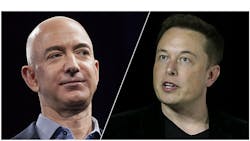Bezos, Musk Have Different Ideas About How to Pay for Space Race
Jeff Bezos has sold $4 billion of Amazon.com Inc. stock in the past three years, including $1.1 billion just last week, using most of the money to support his space company, Blue Origin LLC.
That sets its business model apart from other billionaire-backed space ventures, Elon Musk’s Space Exploration Technologies Corp. and Richard Branson’s Virgin Galactic, which have both taken outside funding and moved more quickly to commercialize operations.
“As the world’s richest man, Bezos has a unique ability to develop his own space transportation company and maintain 100% ownership,” said Chad Anderson,CEO of Space Angels Holdings, a space-focused investment fund. “This is different than almost every other space company, which must build excitement and momentum to attract equity investors or NASA funding.”
There’s a clear difference with Musk’s SpaceX, which sought to generate revenue as soon as possible after its founding in 2002. Securing commercial launch contracts helped the Hawthorne, California-based firm generate a small operating profit on $1 billion of revenue in 2014, the Wall Street Journal reported in January.
SpaceX, a pioneer in reusing rockets to drive down costs, has a $1.6 billion contract with the National Aeronautics and Space Administration to resupply the International Space Station and a second pact valued at as much as $2.6 billion to transport crews to the orbiting lab. Earlier this year, the company was awarded its second contract to fly missions for the U.S. Air Force, and it plans to send two private citizens on a trip around the moon in late 2018.
The commercial successes — along with a series of funding rounds that raised more than $1.5 billion from investors such as Google, valuing the company at more than $20 billion — allowed Musk, 46, to grow SpaceX without continually relying on his personal fortune, despite the industry’s intensive capital requirements. He’s also the CEO and largest shareholder of Tesla Inc., which accounts for about half of Musk’s $19.7 billion fortune, according to the Bloomberg Billionaires Index.
Branson’s Virgin Galactic, which aims to send paying tourists into sub-orbital space for a few minutes of weightlessness, has also taken on outside investment, with Abu Dhabi’s government investment company ponying up almost $400 million for a minority stake in 2009. Saudi Arabia’s sovereign-wealth fund said last month that it plans to invest about $1 billion in Virgin’s space endeavors.
Spokesmen for SpaceX and Virgin Galactic parent Virgin Group Ltd. declined to comment. Amazon and Blue Origin didn’t reply to requests for comment.
Such investments are becoming more common. About 250 private space ventures received $11 billion in equity financing since 2009, according to an October report by Space Angels.
Bezos, however, has steered clear of that route to maintain absolute control, a costly approach. Selling stock to fund his operations means Bezos, 53, could face $200 million in capital-gains taxes on last week’s transactions. He told a space conference in April that he sells about $1 billion of Amazon stock each year to fund Blue Origin.
But with shares of the Seattle-based retailer on a tear, Bezos has more to burn than just rocket fuel. Last month, he overtook Microsoft Corp. co-founder Bill Gates as the world’s richest person, and ended Monday with a net worth of $95.1 billion, according to the Bloomberg index.
By Tom Metcalf, with assistance from Dana Hull and Spencer Soper.
About the Author
Bloomberg
Licensed content from Bloomberg, copyright 2016.
